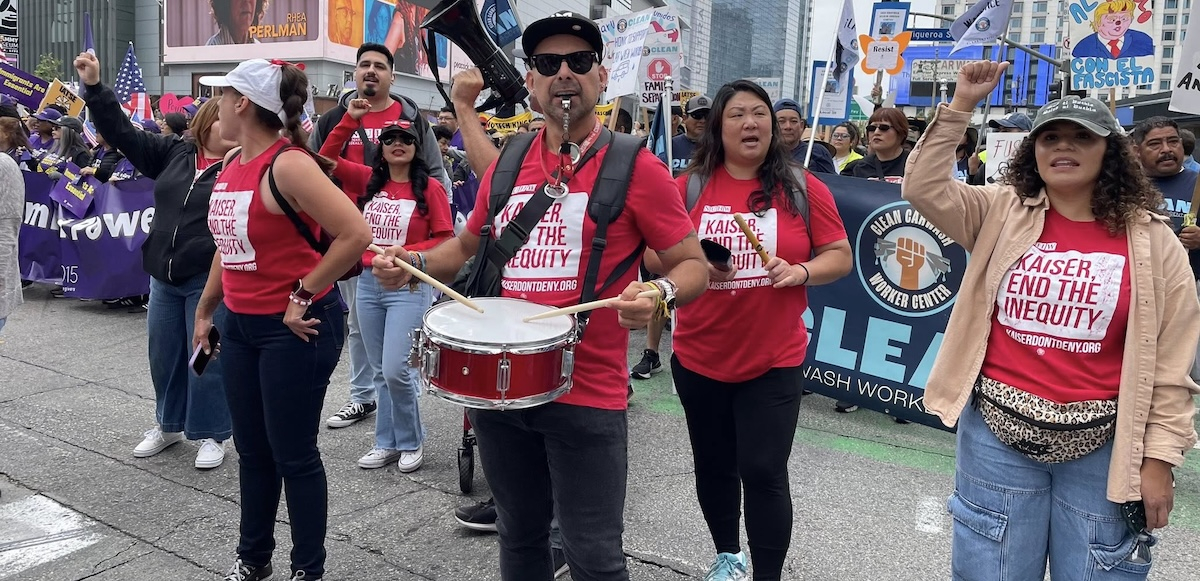Long Strike Yields Big Gains for Kaiser Mental Health Workers

Kaiser strikers march in the May Day parade in Los Angeles. They struck for six-and-a-half months, ending May 5. Photo: NUHW
The 196-day strike of Kaiser Southern California mental healthcare workers is over. The 2,400 therapists, psychiatric nurses, social workers and psychologists won significant gains not just for themselves but for their patients in a time of an acute national mental healthcare crisis. They are members of the National Union of Healthcare Workers.
They outlasted Kaiser, the huge California-based health maintenance organization, with six and a half months of picket lines from Modesto to San Diego. They held rallies at Kaiser’s Southern California medical centers. They blockaded the Sunset Strip. They held a hunger strike, putting their own health on the line to improve care for patients and reverse Kaiser’s record of misconduct.
“There’s no doubt that Kaiser remains hostile to mental health care and to us, they fought us every step of the way. But this is still the best contract we’ve ever won, even though it took us more than six months to win it,” said Jim Clifford, a behavioral health counselor who has worked for Kaiser in San Diego since 2001.
“We didn’t just regain a defined benefit pension, we got our biggest raises ever and more than double the amount of guaranteed time for patient care duties,” he said.
OVER SIX MONTHS OUT
“These negotiations were like fighting a battle,” said Adrianna Webb, a bargaining committee member and medical social worker at Panorama City in Los Angeles.
A temporary agreement was reached on May 4 and the strike ended May 5. The four-year contract will go into effect retroactively from October 1, 2024.
The new contract includes raises of 20 percent over four years, and an additional $2500 signing bonus. It includes a modified defined pension plan, a big step toward restoring the plan Kaiser took away, plus five hours a week of prep time.
The strikers wanted seven hours prep time for responding to patient calls and emails, making appointment notes, devising treatment plans and communicating with social service agencies. The prep time is “essential if our patients are going to get the follow-up they deserve, and pay for,” said Webb.
The strikers also sought equity with Kaiser medical workers and equity with mental health workers in Northern California, and they weren’t able to achieve that.
‘DANGEROUSLY BROKEN’
The other big strike issue was chronic understaffing. They got no guarantee that major improvements in staffing will be forthcoming.
“Kaiser’s systemic behavioral health failures have fatal consequences for communities throughout Southern California and the entire state. There is no shortage of evidence that Kaiser’s mental health system is dangerously broken and has been for a long time,” said Sal Rosselli, president emeritus of NUHW.
As with other labor disputes, Kaiser’s strategy was to stall. They let months pass without coming to the table. When they did come, they had nothing to offer.

SUPPORT LABOR NOTES
BECOME A MONTHLY DONOR
Give $10 a month or more and get our "Fight the Boss, Build the Union" T-shirt.
The strikers faced the holidays without paychecks, though there were truckloads of toys from supporting unions.
Kaiser had plenty of money to try to starve out the strike. Its 2023 profits were $4.1 billion in 2023; it has $64 billion in the bank. Kaiser CEO Greg Adams’ 2023 “compensation” was $17,268,060.
“They spent far more money trying to break us than settling with us would have cost. They paid scab therapists $13,000 a week,” said Clifford.
OTHER UNIONS RALLIED
Kaiser claims to be union-friendly; its roots are in collaboration with unions in the nineteen forties. Tens of thousands of trade unionists are patients. But Kaiser ignored these workers demands, as well as virtually the entire Southern California labor movement’s call to settle. Central Labor Councils in San Diego and Los Angeles supported the strike, as did Orange County and the Inland Empire.
“All the CLCs were extraordinary in their ongoing support,” said Rosselli. The teachers’ unions, the Communications Workers, UFCW 770, Longshore workers, and nurses also came out in support.
Elected officials weighed in. California Senate President Pro Tempore Mike McGuire sent Kaiser a letter signed by 20 senators expressing concern that Kaiser was canceling therapy sessions at “an alarming rate” during the strike. They urged CEO Adams to “agree to the union’s reasonable contract proposals in order to ensure the delivery of timely and appropriate behavioral health services to your patients.” Los Angeles City Councilman Hugo Soto Martinez came often to picket lines and honored the strikers at an L.A. City Council meeting.
“I’m proud that we took a stand for mental health care and made gains for ourselves and patients,” Lourdes Cortez, a social worker for Kaiser in Bakersfield. “We stood up to a behemoth, and we kept fighting for as long as it took to get a contract we can build upon.”
[Cal Winslow’s is author of Labor’s Civil War in California and editor of E.P. Thompson and the Making of the New Left. His latest book is Radical Seattle, The General Strike of 1919.]



